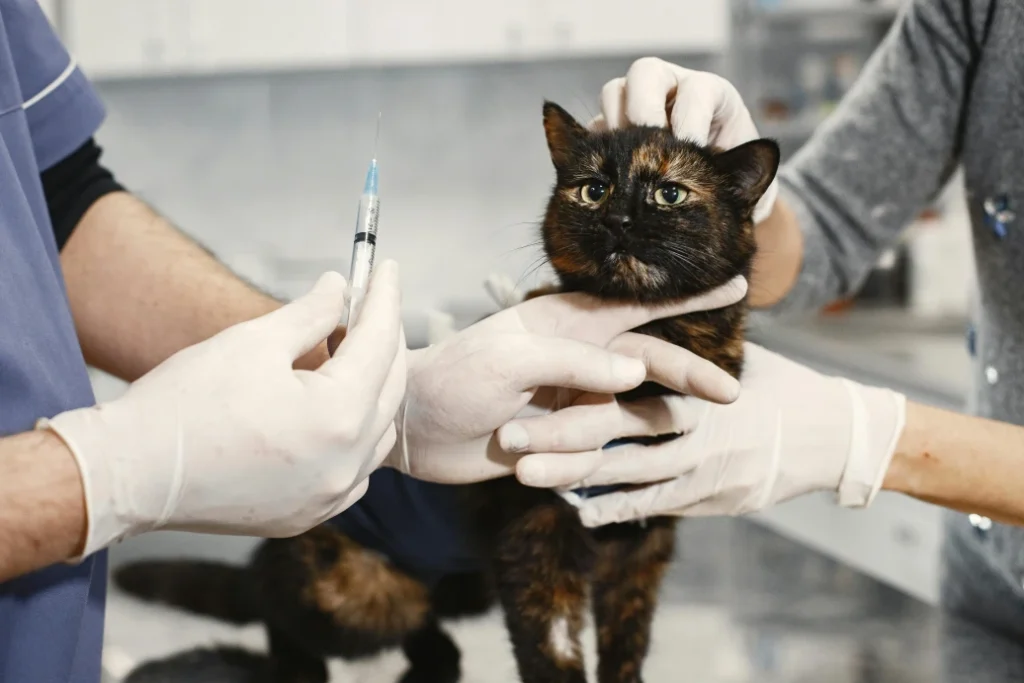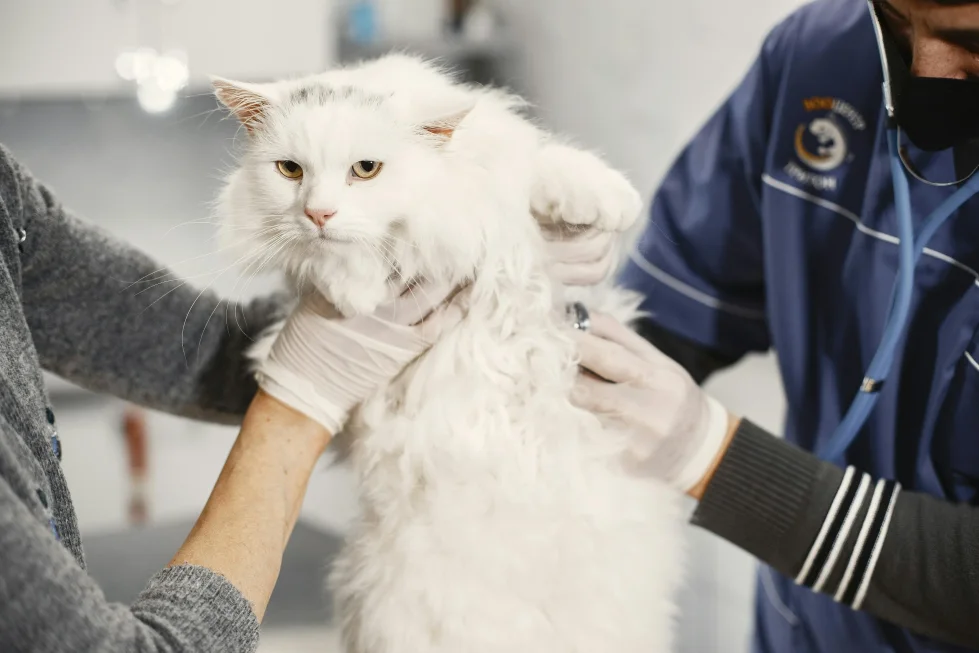The fvrcp shot for cats of the most essential vaccines given to a kitten, whose responsibility is to help colorful serious diseases in our feline. The following details will help you watch for your cats by explaining why this vaccine is so important when your kitten needs to admit it, and what it’ll do for your feline.
Explain FVRCP Vaccine
The FVRCP vaccine is a combination shot that rescues kittens against three serious infections: Feline Viral Rhinotracheitis (FVR), Calicivirus (C), and Panleukopenia (P). All of these infections are dangerous to your kitten regardless of whether or not they go outside.
- Feline Viral Rhinotracheitis (FVR): Feline herpes virus, a respiratory complaint. It attacks the respiratory system especially nasal and optical mucosa manifesting as sneezing, and nasal discharge, and may produce conjunctivitis.
- Calicivirus (C): TB like respiratory disease that causes mouth ulcers, eye and nose discharge, and sometimes joint pains and/ or pneumonia.
- Panleukopenia (P): This is also referred to as feline distemper or parvo and targets cells that are dividing and affect its victim’s gastrointestinal tracts, there is fever, vomiting, and diarrhea.
[wptb id=2277]
Necessary Reasons for FVRCP Vaccine?
The FVRCP shot is important because it protects your kitten against easily spread infections. Your cat could become infected with these viruses even if your kitten resides inside your home through contact with contaminated fixtures, people, and other kitties. They may develop chronic complications or prove lethal if given no medical attention.
- Feline Rhinotracheitis causes chronic respiratory disease in felines.
- Panleukopenia is almost always fatal and is most fatal in young kittens.
FVRCP Cat Get the Shot?
A first dose of FVRCP typically occurs when the kitten is between six and eight weeks of age. Following this he will require booster vaccinations at 3-4 weekly intervals until he is 16 weeks old. This booster schedule is vital since the disease is more hazardous to the little felines because they are more vulnerable to it than mature cats.
Kittens should make at least three shots at the age of 6, 8, and 12 weeks then get vaccinated annually, or they get a booster after the first series and then every three years. Adherence to this schedule makes certain the cat is shielded for their entire life.
FVRCP for Indoor Cats is Necessary?

In-home kittens might be seen as not requiring vaccinations for their fitness, but this is a misconception. There is still a risk of infectious illnesses in indoor cats. For example, the panleukopenia virus lasts for months on surfaces and if you introduce the virus in your home without knowing it, your cat is infected. Also, if your cat is ever left at a cattery or comes into contact with other cats during visits to the veterinarian, they may be at risk.
FVRCP Vaccine Side-Effects
As with most vaccinating procedures, FVRCP cats’ injections might bring minor ill effects beneath the skin. These reactions are normally transient and they regress within 24 to 72 hours of starting the treatment. Some common side effects include:
- Mild fever
- Reduced appetite
- Some redness and a small amount of puffiness in the area of the injection.
- Temporary lethargy
Rare side effects include an allergic reaction which may be acute. Vomiting and diarrhea, inflammation around the face. In any case, if your cat develops severe side effects after the shot, then you should call your vet.
After FVRCP Vaccine
Many cats react positively to the FVRCP vaccine, and they experience mild or no symptoms at all. In return, you may find that your cat looks a little tired or doesn’t want to eat as much for one or two days as the body establishes immunity.
It is important that after the vaccination you observe your cat for signs and symptoms of other ailments. If injected areas are inflamed for a week or more and/or if your cat continues to be listless, consult your veterinarian.
How Often Should the FVRCP Vaccine Be Given?
The FVRCP vaccine is given to kittens severally to help them develop the immunity needed to combat the illness. The core vaccination should be given after the first set of shots gauged at intervals between subsequent kitten shots and a booster given one year after the final kitten shot. Later on, the vaccine is administered annually up to twice a year or based on your veterinarian’s advice.
- Kitten Schedule: Initial dose at 6-8 weeks, subsequent boosters in 3-4 weeks intervals up to 16-20 weeks of age.
- Adult Cats: Booster one year after the final kitten shot and thereafter 1-3 years subsequently.
FVRCP Shot for Senior Cats
Your old cat may require a special vaccination schedule depending on their general health and interaction with other animals. Some vets suggest to go on giving the FVRCP shot every three years, while some may decrease or increase this based on how often the cat is exposed to potential pathogens, and the general condition of its immune system. Your older cat must receive checkups with your veterinarian to keep them safe and healthy.
- Prevents Serious Illnesses: The FVRCP vaccination immunizes your cat against rhinotracheitis, calicivirus, and panleukopenia; all these illnesses can be lethal to your pet.
- Minimizes Vet Bills: The treatment of these diseases may be expensive or take a long time to manage. Have your cat vaccinated often so there will be a reduced need for costly procedures.
- Protects Indoor and Outdoor Cats: Whether or not they go outdoors, the FVRCP shot offers the best safeguard against communicable feline viruses.
- Peace of Mind: Having your cat vaccinated means that you can free yourself from worrying whenever you notice that your pet is unwell.
Potential Risks of Not Vaccinating
Not taking your cat through FVRCP immunization exposes it to fatal diseases, more so in the case of a kitten or senior cat with a comparatively weakened immune response. There are other severe effects associated with feline disseminated diseases, which include lifelong respiratory diseases, severe gastroenteritis, or death.
- Protects against three main conditions FIV, herpes contagion, CRV, contagions that beget rhinotracheitis, calicivirus, and panleukopenia.
- Kittens require vaccinations to be administered in a sequence, adult cats require boosters.
- The adverse effects are rare and result in only minor discomfort and typically last only a few days.
- Most of the vaccinations are aimed at preventing fatal diseases and also cut your cat’s long-term risks.
Can FVRCP Combined With Other Vaccines?

Yes, you might want to know, that your vet or groomer can fatten the FVRCP with other core vaccines such as the rabies shot as per your cat. With combination shots, your cat is immediately protected and it reduces the often time visiting of your veterinarian.
Conclusion
FVRCP shot for cats is something every cat owner should discuss with their vet as part of a cat’s health care regimen. This vaccine protects your cat against three severe, and possibly deadly diseases, making your cat healthy all the time. It does not matter whether the cat is a kitten, actively running around and simply happy to play with anything found, or a cat that has almost reached the ‘senior’ age, it is important to have the FVRCP shot throughout the cat’s life.
Finally, vaccinations given by a veterinarian, now and then, as well as additional feline checkups will prevent your pet cat from sickness and will ensure that you are relaxed knowing that your cat is secure from all sorts of diseases. As earlier stated, by adhering to the dosages as recommended, and observing for side effects; your cat would live healthy just like any other cat.
FAQ’s
Do indoor cats need vaccines?
Does FVRCP protect against parvo?
Does FVRCP protect against parvo?
Read more related blogs on this topic
- Cat Dental Chart: Understanding Your Felines Oral Care
- How To Keep Cat Water From Freezing: Tips for Cold Weather
- Cats and Cod Liver Oil: A Complete Guide and Tips

